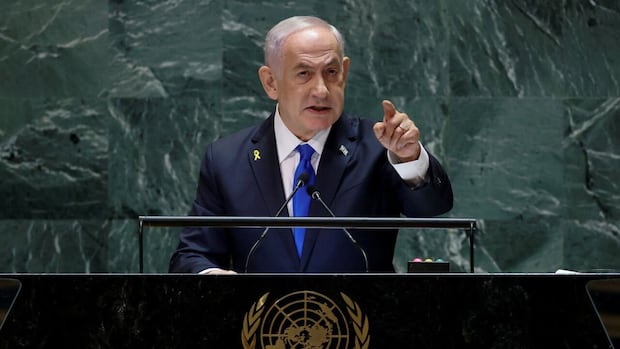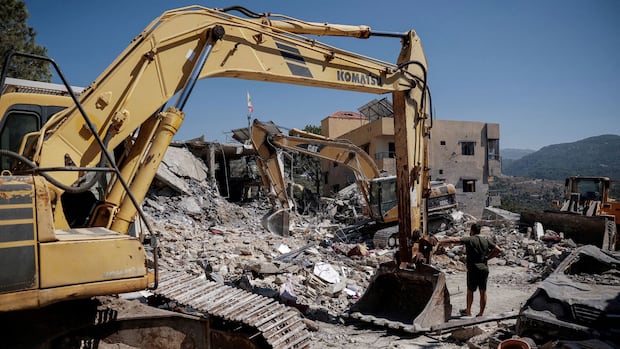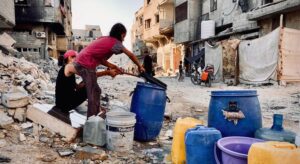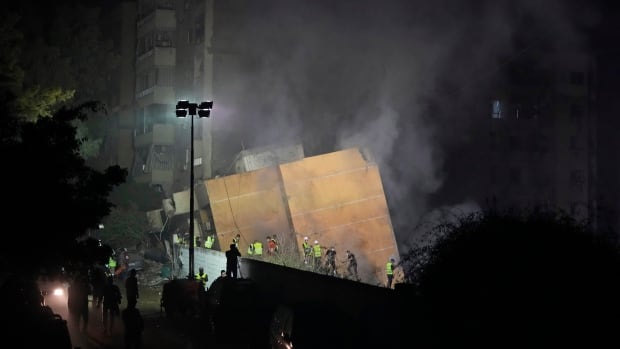
The Israeli military said Friday it struck the central headquarters of Hezbollah in Beirut, where a series of massive explosions levelled multiple buildings, sending clouds of orange and black smoke billowing in the skies.
The strikes in the suburbs south of Lebanon’s capital came shortly after Israeli Prime Minister Benjamin Netanyahu addressed the UN, vowing that Israel’s campaign against Hezbollah would continue. His comments further dimmed hopes for an internationally backed ceasefire aimed at preventing a spiral into all-out war.
Three major Israeli TV channels said Hezbollah leader Hassan Nasrallah was the target of the strikes.
But the unsourced reports could not immediately be confirmed by The Associated Press, and the army declined comment. But given the size and timing of the blast, there were strong indications that a high-value target may have been inside the buildings struck.
Shortly after the strike, Netanyahu’s office said he is cutting his visit to the U.S. short and returning home. The prime minister had been scheduled to stay in the U.S. until Saturday night, after the end of the Jewish sabbath.
Israeli politicians do not normally travel on the sabbath except for matters of great importance.
Israeli Prime Minister Benjamin Netanyahu vowed to continue Israel’s attacks on Iranian-backed fighters in Lebanon in his address to the UN General Assembly. He also vowed to see all hostages returned from Gaza and rejected any post-war role there for Hamas.
To a degree unseen in past conflicts, Israel this past week has aimed to eliminate Hezbollah’s senior leadership.
Friday’s bombings were the most powerful yet seen in the Lebanese capital in the past year. The Israeli army spokesman, Rear Adm. Daniel Hagari, said it targeted the main Hezbollah headquarters, located beneath residential buildings.
Four buildings in the Haret Hreik neighbourhood of Dahiyeh were reduced to rubble, Hezbollah’s Al-Manar TV reported. The blast rattled windows and shook houses some 30 kilometres north of Beirut. Ambulances were seen headed to the scene, sirens wailing.
Officials at a nearby hospital said they received at least 10 wounded, three critically — including a Syrian child.
Israel dramatically intensified its airstrikes in Lebanon this week, saying it is determined to put an end to more than 11 months of Hezbollah fire into its territory. The scope of Israel’s operation remains unclear, but officials have said a ground invasion to push the militant group away from the border is a possibility. Israel has moved thousands of troops toward the border.
At least 25 people were killed in Israeli strikes early Friday, Health Minister Firass Abiad said, bringing the death toll in Lebanon this week to more than 720. He said the dead included dozens of women and children.
CBC News senior international correspondent Margaret Evans says the streets of Beirut are quiet for a city its size. Many people are trying to escape Israeli airstrikes in Lebanon’s south, moving farther north in the country, into Syria or overseas.
Earlier in the day, after another airstrike in the city set off a sonic boom, Malak Mahmoud Saleh, 33, said the constant bombardment is fraying her nerves and scaring her children.
“We are traumatized. Even my kids, they are always screaming and crying,” she told CBC’s Margaret Evans. “I’m even taking medication to calm my nerves.”
Saleh left the southern city of Mahrouna with her three children, husband and mother-in-law when Israeli airstrikes destroyed her home and three neighbouring buildings. She was sheltering with her three children in a primary school turned into accommodation for the displaced, using her experience running a grocery store to help organize supplies and food.
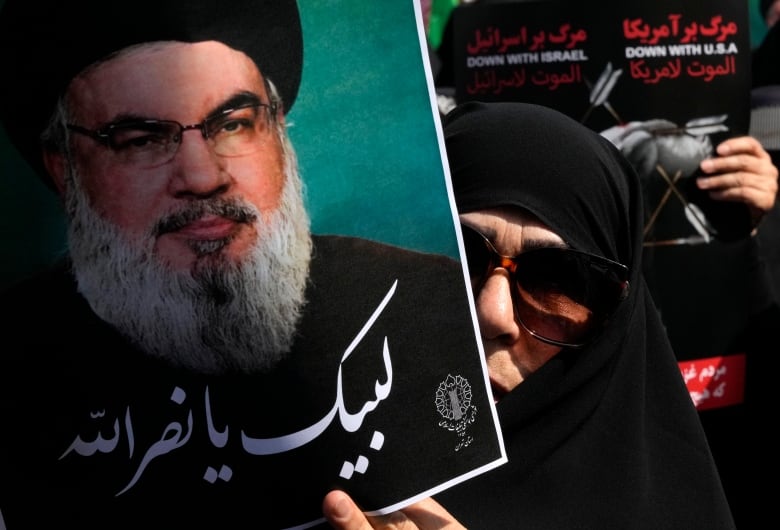
“We didn’t lose anyone, thank God, but people fled towards Jezzine, Jbeil and the mountains,” Saleh said. “Thankfully, everyone is OK. We talked to them yesterday. Everyone is displaced somewhere.”
She said compared to the 2006 war with Israel, this one feels closer to her doorstep and she is more afraid now that she also has children and a husband to worry about.
“Now, people are politically angry,” she said. “At first, the militants were far away, but now it’s closer, and the state is broken; everything is broken.”
9 members of same family among dead
A predawn strike Friday in the mainly Sunni border town of Chebaa hit a home, killing nine members of the same family, the state news agency said. A resident identified the dead as Hussein Zahra, his wife, Ratiba, their five children and two grandchildren.
At the UN, Netanyahu vowed to “continue degrading Hezbollah” until Israel achieves its goals.
Netanyahu’s comments have damped hopes for a U.S.-backed call for a 21-day truce between Israel and Hezbollah to allow time for a diplomatic solution. Hezbollah has not responded to the proposal.
Iranian-backed Hezbollah, the strongest armed force in Lebanon, began firing rockets into Israel almost immediately after Hamas’s Oct. 7 attack, saying it was a show of support for the Palestinians. Since then, it and the Israeli military have traded fire almost daily, forcing tens of thousands of people to flee their homes on both sides of the border.
An Israeli security official said he expects a possible war against Hezbollah would not last for as long as the current war in Gaza because the Israeli military’s goals are much narrower.
In Gaza, Israel has vowed to dismantle Hamas’s military and political regime, but the goal in Lebanon is just to push Hezbollah away from the border with Israel — “not a high bar like Gaza” in terms of operational objectives, said the official, who spoke on the condition of anonymity due to military briefing guidelines.
Hezbollah supporters defiant
Israel says its accelerated strikes this week have already inflicted heavy damage on Hezbollah’s weapons capabilities — and a string of its top commanders have been assassinated in strikes. Officials have suggested its limited fire of missile and rockets the past week show it has been set back.
But the group boasted a large arsenal of rockets and missiles and its remaining capacities remain unknown.
Hezbollah officials and their supporters remain defiant. Not long before the explosions Friday evening, thousands were massed in another part of Beirut’s suburbs for the funeral of three Hezbollah members killed in earlier strikes, including the head of the group’s drone unit, Mohammed Surour.
Men and women in the crowd waved their fists in the air and chanted, “We will never accept humiliation” as they marched behind the three coffins, wrapped in the group’s yellow flag.
Hussein Fadlallah, head of Hezbollah in Beirut, said in a speech that no matter how many commanders Israel kills, the group has endless numbers of experienced fighters who are deployed all over the front lines. Fadlallah vowed that Hezbollah will keep fighting until Israel stops its offensive in Gaza.
“We will not abandon the support of Palestine, Jerusalem and oppressed Gaza,” Fadlallah said. “There is no place for neutrality in this battle.”
